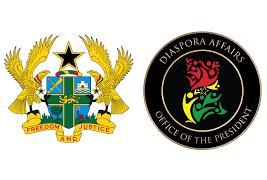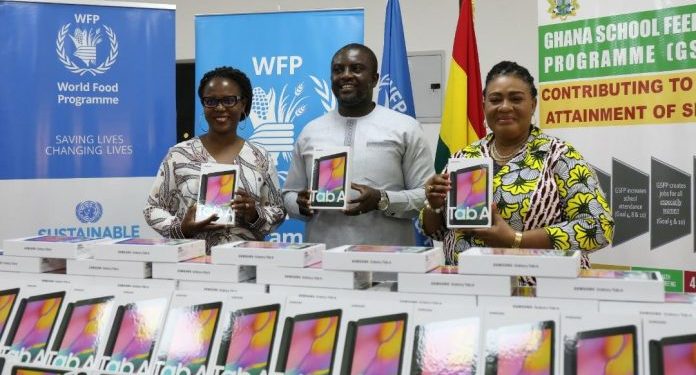The World Food Programme (WFP) has provided the Ghana School Feeding Programme (GSFP) with 300 digital tablets to pilot the digitization of its monitoring and evaluation system.
The Samsung digital tablets would be distributed nationwide to monitor, among other things, daily attendance and feeding in selected schools throughout all 260 Metropolitan, Municipal, and District Assemblies (MMDAs).
Dr Mrs Gertrude Quashigah, the National Coordinator of the Ghana School Feeding Programme (GSFP), was overjoyed during a brief handover ceremony in Accra because the Programme’s goal of becoming digital had become a reality.
“These tools would help GSFP to digitise our monitoring system in order to ensure real speed and more efficiency in the programme. It will also help in our quest to tighten all loose ends at the local levels where the actual implementation of the programme take place”.
She said that the tablets would also assist to simplify GSFP’s day-to-day operations, particularly in terms of verifying enrollment numbers, information flow, and monitoring the overall performance of caterers, thus infusing sanity into the program’s operations.
Mrs Quashigah was certain that transitioning from a manual to a digital operating system would improve GSFP’s credibility, transparency, and accountability.
The National Coordinator guaranteed that the tools will be utilized for the purpose for which they were given and maintained for optimum advantage, describing the relationship between GSFP and WFP as “solid” and “worthy.”
She, on the other hand, requested assistance in digitizing the whole Ghana School Feeding Programme in the near future in order to provide an efficient home-grown School Feeding Programme in Ghana.
Ms Anna Mukiibi-Bunnya, WFP Representative ad interim and Officer-in-Charge, emphasized the significance of the digitization initiative and its eventual objective.
“In summary, the tablets will enhance the monitoring and reporting capacity of the Ghana School Feeding Programme as actual data on school attendance and feeding will be generated to enable payments to reflect these numbers. This should lead to cost-effectiveness and savings which can be used to expand the programme, to reach more schoolchildren. This is the ultimate goal.”
Ms Mukiibi-Bunnya appealed to the telcos to assist GSFP with the necessary data for the project’s viability since the tablets would operate on data, especially given the shaky network condition in certain areas of the nation.
Meanwhile, the Ghana School Feeding Programme has obtained SIM cards pre-loaded with data for the tablets, ensuring internet connection and data transmission.
Dr Kwabena Bempah Tandoh, Deputy Director-General in charge of Quality and Access at the Ghana Education Service, praised the initiative and stated that the GES will also roll out a system to monitor students’ attendance, with the aim of sharing data with the GSFP on that level as well.
Touting the importance of school feeding, he said, “as at now, we have data and evidence to show that if you go into communities where the school feeding programme is happening in one school and not in the other school, it shows in the enrollment. Most of the students gravitate to the schools where there is a school feeding programme”.
Mrs Akyere Frimpong Manu, Director of Monitoring and Evaluation at Ghana School Feeding Programme, who is in charge of project execution, informed journalists that training of trainers workshop is being organized for GSFP personnel at the National Secretariat.
She said that the trained team will be sent for national training beginning October 18 to educate headteachers, Circuit Supervisors, and GSFP regional employees on the usage of the tablets.
During the pilot stage, over 300 users are anticipated to be taught to utilize the tablets.
Read Also: Court adjourns case against Takoradi fake pregnant woman to November 11




























